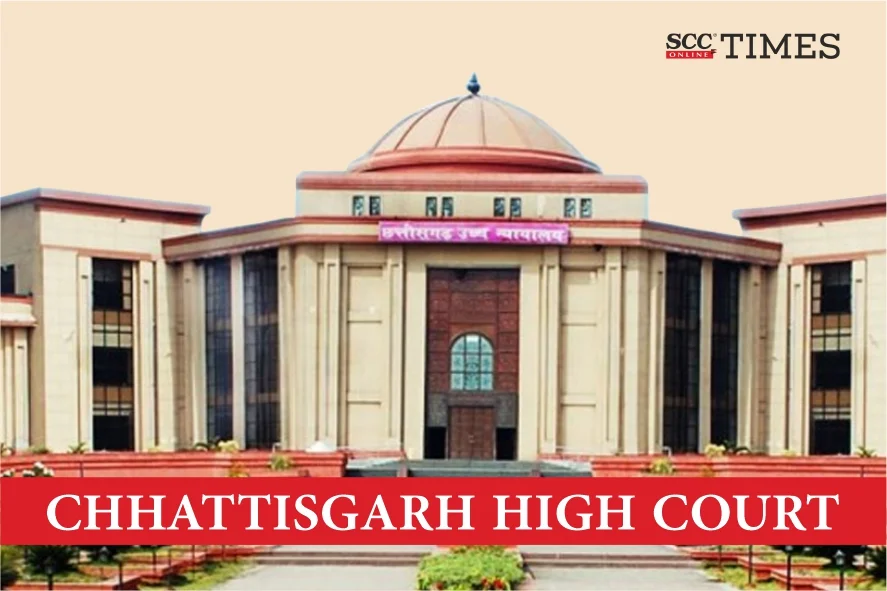Chhattisgarh High Court: In a writ petition challenging the selection process of an examination, the Division Bench of Ramesh Sinha, CJ., and Ravindra Kumar Agrawal, J., opined that it was trite law that a candidate taking a calculated chance by appearing in the examination after knowing fully well the procedural norms, eligibility qualifications and only because the examination’s result was not palatable to him, could not turn around and subsequently, question the method of selection/eligibility qualification. Thus, the Court opined that from perusal of the records, it transpired that the petitioners having appeared in recruitment process consciously and willingly, could not be allowed to question the process of selection.
Background
On 21-08-2023, Respondent 1 published an advertisement for direct recruitment of Hand Pump Technician for 188 posts in which 69 posts were reserved for Scheduled Tribes. Petitioner 1 and 2 belonged to Scheduled Tribes category and Petitioner 3 belonged to Scheduled Caste category. Petitioners applied for post of Head pump technician and submitted their applications through online in the site of Chhattisgarh Professional Examination Board, Raipur. Thereafter, as per schedule, examination was conducted, and petitioners participated in the said examination. After examination, Chhattisgarh Professional Examination Board issued a combined merit wise list on 06-10-2023 in which petitioners found their names.
Thereafter, respondents issued a letter for counselling and verification of documents and accordingly, all the relevant documents were produced by petitioners, in which mark sheet of diesel mechanic by the Industrial Training Institute (‘ITI’) was produced which showed that one year course had been done by all the petitioners. However, later, petitioners were declared ineligible on the ground that petitioners submitted one year certificate whereas the departmental recruitment rules and advertisement determined two years certificate. Thus, petitioners after finding their names in the list of ineligible candidates, filed the present writ petition.
Petitioners contended that Ruled 8 (II) of the Chhattisgarh Public Health Engineering Department (Non-Gazetted) (Recruitment and Conditions of Service) Rules, 2016 (‘2016 Rules’) was ultra vires because in the Engineering Trade there were both one- and two-years course. Further, diesel mechanic and tractor mechanic came under the mechanical trade, which was only one year course and as reflected from earlier appointments, respondents themselves declared diesel mechanic as eligible candidate. Petitioners also submitted that Rule 8 (II) of the 2016 Rules for appointment of Hand Pump Technician disclosed that selection and appointment were ultra vires and discriminatory against petitioners as Respondent 4 and ITI itself adopted a procedure of one year for Hand Pump Technician under the mechanical trade. Therefore, in place of two years course from ITI it must be replaced with two years and one year course certificate from ITI.
Analysis, Law, and Decision
The Court referred to Madan Lal v. State of J&K, (1995) 3 SCC 486 (‘Madan Lal case’) and opined that it was trite law that a candidate taking a calculated chance by appearing in the examination after knowing fully well the procedural norms, eligibility qualifications and only because the result of examination was not palatable to him, could not turn around and subsequently, question the method of selection/eligibility qualification.
The Court opined that from perusal of the records, it transpired that the petitioners having appeared in recruitment process consciously and willingly, could not be allowed to question the process of selection. The Court opined that petitioners took a calculated chance to get a berth in the said recruitment but finding that they were not selected, decided to file writ questioning the 2016 Rules, that it was not in accordance with law. The Court opined that petitioners could not be allowed to act in such a manner on the principle of law laid down in Madan Lal case (supra) and further reiterated in Dhananjay Malik v. State of Uttaranchal, (2008) 4 SCC 171, Vijendra Kumar Verma v. Uttarakhand Public Service Commission, (2011) 1 SCC 150, Ramesh Chandra Shah v. Anil Joshi, (2013) 11 SCC 309 and Madras Institute of Development Studies v. Dr. K. Sivasubramaniyan, (2016) 1 SCC 454.
[Manish Kumar Kashyap v. State of Chhattisgarh, 2024 SCC OnLine Chh 1753, Order dated 11-03-2024]
Advocates who appeared in this case :
For the Petitioners: Shrawan Agrawal, Advocate;
For the Respondents: Prafull N. Bharat, Advocate General with Vinay Pandey, Deputy Advocate General








The Chhattisgarh HC’s stance reinforces the importance of candidates thoroughly assessing eligibility criteria before applying, maintaining transparency and integrity in recruitment processes.